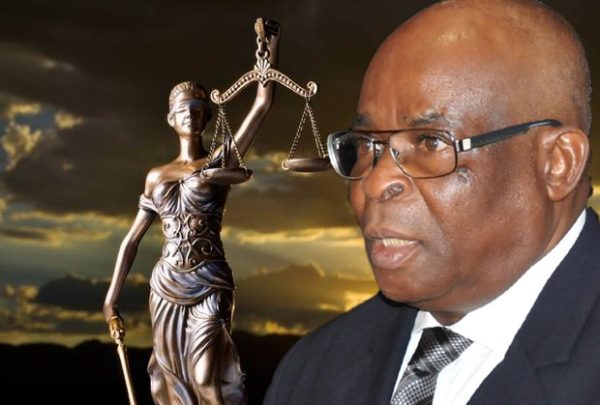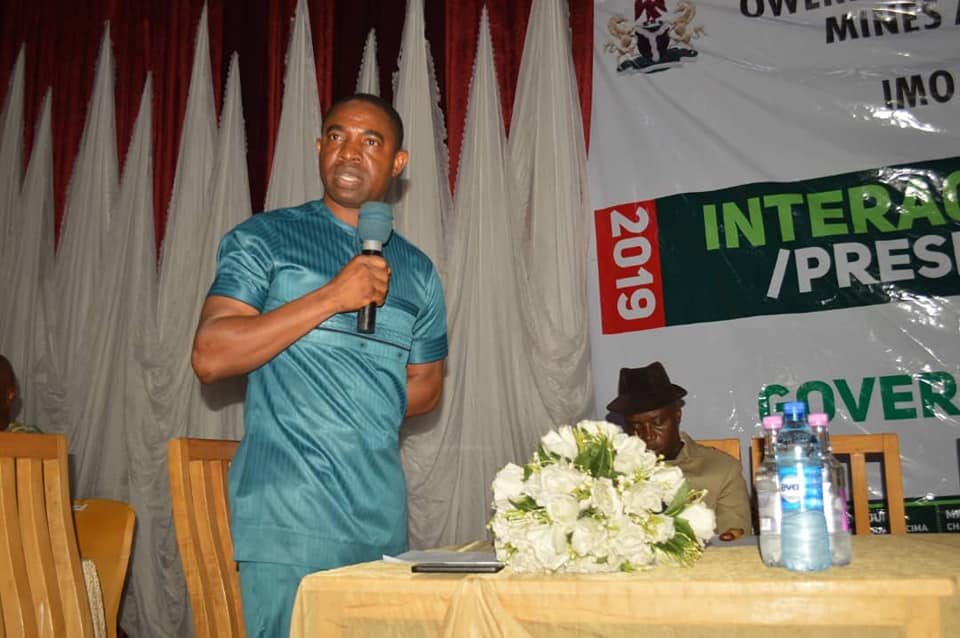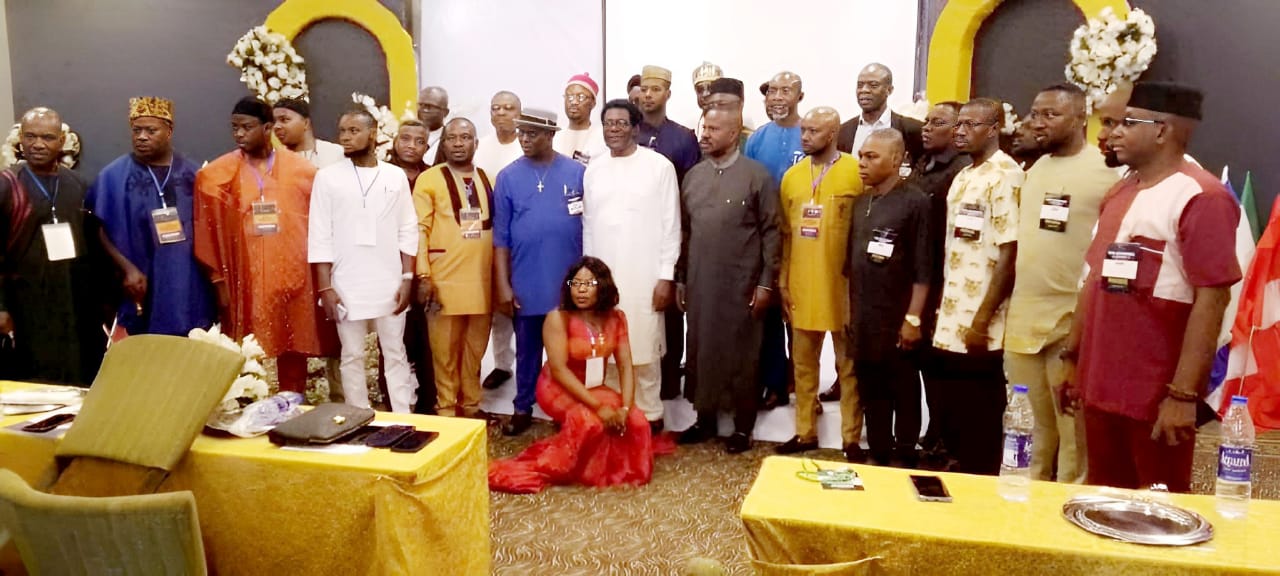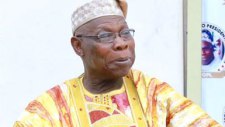Onnoghen : Nwabueze calls for Buhari, Malami, Umar’s resignation for subverting constitution

LEGAL luminary and elder statesman, Professor Ben Nwabueze, SAN, has called for the resignation of President Muhammadu Buhari, Attorney General of the Federation and Justice Minister, Abubakar Malami, SAN; and Chairman of the Code of Conduct Tribunal, CCT, Justice Danladi Umar for allegedly subverting the constitution via the suspension of the Chief Justice of Nigeria, CJN, Justice Walter Onnoghen.
According to Nwabueze, the CCT chairman cannot order the suspension or vacation from office of a public officer until after trial, hence ”the CCT acted ultra vires the Constitution in making the order directing the President to suspend the CJN from office. The suspension is unconstitutional, null and void.”
He also argued that President Buhari has no power to suspend Onnoghen and appoint an acting CJN. In a 2,197-word statement, yesterday, Nwabueze said ”President Buhari’s suspension of the Chief Justice of Nigeria from office is, in itself, a most condemnable subversion of the Constitution, but his statement while announcing it to the public makes the action so absurdly subversive.” While suspending Onnoghen and appointing Justice Tanko Muhammad as acting CJN, in line with the CCT’s ex-parte order, President Buhari said, ”in line with this administration’s avowed respect for the Rule of Law, I have wholeheartedly obeyed the Order of the Code of Conduct Tribunal dated 23rd January 2019.” Said Nwabueze: ”The ‘administration’s avowed respect for the Rule of Law’ and for obedience of court orders sound like a deliberate perversion of truth, as witness Dasuki’s continued detention four years after a court of law ordered his release on bail, and same as Ibrahim Yaquob El Zakzaky two years after he was granted bail. ”The President’s statement raises several questions, the most crucial of which is as to whether the CCT has the power to order or direct the President to suspend the CJN. Second, whether the President, incarnating the Nigerian state, and as guardian of its Constitution, is bound to carry out the order, even when he knows, as he ought to know, that he has no power to suspend the CJN. Third, do the circumstances in which the order of the CCT was obtained not suggest a pre-meditated plan to subvert the Constitution?” He continued: ”With respect to the first question above, the suspension is manifestly subversive of paragraph 18 of the Fifth Schedule to the Constitution (1999), which provides as follows: “18. (1) Where the Code of Conduct Tribunal finds a public officer guilty of contravention of any of the provisions of this Code it shall impose upon that officer any of the punishments specified under sub-paragraph (2) of this paragraph and such other punishment as may be prescribed by the National Assembly. (2) The punishment which the Code of Conduct Tribunal may impose shall include any of the following – (a) vacation of office or seat in any legislative house, as the case may be. (b) disqualification from membership of a legislative house and from the holding of any public office for a period not exceeding ten years; and (c) seizure and forfeiture to the State of any property acquired in abuse or corruption of office. (4) Where the Code of Conduct Tribunal gives a decision as to whether or not a person is guilty of a contravention of any of the provisions of this Code an appeal shall lie as of right from such decision or from any punishment imposed on such person to the Court of Appeal at the instance of any party to the proceedings. ”It is clear from paragraph 18 that: only the CCT itself can order vacation of or suspension from office; the President is not empowered to do so, and cannot be ordered or directed by the CCT to do so; more importantly, the CCT cannot make an order vacating an office or suspending a person from office until the trial before it is completed and the accused person is found “guilty of contravention of any of the provisions of this Code”; the trial in this case is only just commencing; the right of appeal to the Court of Appeal conferred by paragraph 18(4) of the Fifth Schedule is from a decision of the CCT finding the accused person guilty of contravention of the Code, not from the action of the President suspending the accused person from office even when the action (suspension) is on the direction of the CCT; the denial of that right is a violation of the Constitution. ”In conclusion, the CCT acted ultra vires the Constitution in making the order directing the President to suspend the CJN from office. The suspension is unconstitutional, null and void. The second question raised above, though not as crucial, is remarkable for its great intricacy. The impression created by his statement is that the President is trying to hide under the cover of the principle that an order of court directing him to do something imposes upon him a duty to carry out the order, notwithstanding that he does not have the power to do the thing in question, and that we are thereby precluded from enquiring as to whether or not he in fact has the necessary power. The ex parte order the President obtained from the CCT directing him to suspend the CJN from office does not, and cannot, erase the fact that he lacks the power to do that. The New Webster Dictionary of the English Language defines “suspend” to mean “to remove temporarily from an office, to cause to cease for a time from operation or effect”. The CJN is both the head of the judiciary, in which role he exercises largely administrative functions, as well as a justice of the Supreme Court; his removal (or suspension) from office as CJN can only be effected by the President with the support of two-thirds majority of the Senate, while his removal as an ordinary justice of the Supreme Court is by the President on the recommendation of the National Judicial Council (NJC) – section 292 Constitution 1999. The suspension (removal) of the CJN from office by the President does not comply with the two requirements of section 292 of the Constitution and is therefore null and void, notwithstanding that it is ordered by the CCT. ”The President had followed the suspension of the CJN with the appointment of the most senior justice of the Supreme Court as Acting CJN. The validity of the acting appointment depends on whether there is a vacancy in the office. Without a vacancy, no one can validly be appointed to the office in an acting capacity. Be that as it may, an acting appointment must comply either with any special constitutional provisions relating thereto or, if there is none, then, with the general provisions governing the appointment of a CJN. These require the appointment to be made by the President on the recommendation of the NJC subject to confirmation by the Senate: section 231(1). The 1999 Constitution has no special provision relating to the appointment of a CJN in acting capacity. The general provisions in section 231(1) therefore apply. The circumstances surrounding the suspension of Onnoghen and the hurried swearing-in of Mohammed as Acting CJN suggest that section 231(1) is not complied with in the swearing-in of the latter. The acting appointment is therefore null and void. ”In this connection, section 231(4) of the 1999 Constitution differs significantly from section 211(4) of the 1979 Constitution, which reads: “(4) If the office of Chief Justice of Nigeria is vacant, or if the person holding the office is for any reason unable to perform the functions of the office, then until a person has been appointed to and has assumed the functions of that office, or until the person holding the office has resumed those functions, the functions shall be performed by a person to be designated from time to time in that behalf by the President, acting in his discretion, from among the Justices of the Supreme Court.








